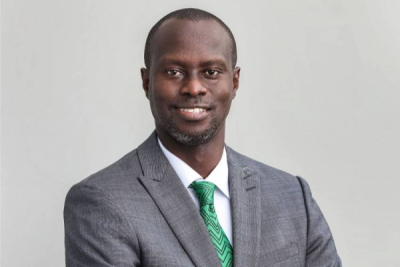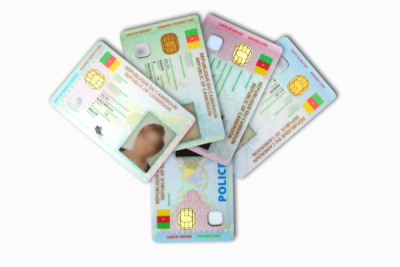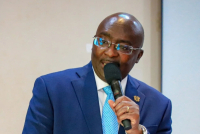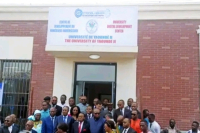Nigeria aims to expand its fiber optic network to at least 125,000 km to ensure complete coverage and offer high-speed internet services to its entire population.
Nigeria's Minister of Communications, Innovation, and Digital Economy, Bosun Tijani, announced the approval of a special purpose vehicle (SPV) on May 14. The SPV will oversee the construction of an additional 90,000 kilometers of terrestrial fiber optic cables, significantly expanding the country's broadband infrastructure.
This decision, made during the Federal Executive Council (FEC) meeting, is expected to benefit Nigerians across the board, particularly the nation's burgeoning startup ecosystem.
"Building on our existing work with the Broadband Alliance," Tijani wrote on a social media platform (formerly known as Twitter), "this increased connectivity will help plug the current non-consumption gap by connecting over 200,000 educational, healthcare and social institutions across Nigeria, ensuring that a larger section of our society can be included in the benefits of internet connectivity."
Partnering with public and private stakeholders, the SPV will build the additional fiber optic network, extending Nigeria's national connectivity backbone to at least 125,000 kilometers, up from the current 35,000 kilometers. Upon completion, this will position Nigeria with the third-longest terrestrial fiber optic backbone in Africa, behind Egypt and South Africa.
The fiber optic expansion is expected to have a substantial impact on the Nigerian economy. It is projected to increase internet penetration beyond 70%, potentially reduce internet access costs by over 60%, and connect at least half of the estimated 33 million Nigerians currently without internet access. Additionally, it could drive GDP growth from $472.6 billion in 2022 to $502 billion within the next four years.
Samira Njoya
By mitigating cyber threats and ensuring the integrity of digital transactions, this move demonstrates a commitment to strengthening regulatory frameworks to support the burgeoning digital economy, which is essential for driving innovation and advancing economic development across the continent.
President Bola Tinubu (pictured) has directed the Central Bank of Nigeria to pause the implementation of the controversial cybersecurity levy policy for a comprehensive review. This follows the House of Representatives' call last Thursday, May 9, to retract the directive imposing a 0.5 percent levy on electronic transactions.
The CBN circular issued on May 6, 2024, mandated financial institutions to enforce the levy under the Cybercrime (Prohibition, Prevention, etc) (Amendment) Act 2024. President Tinubu's directive urges a pause on the levy's implementation, reflecting his commitment to easing economic burdens on Nigerians amidst ongoing reforms.
The levy proposal was met with resistance from Nigerians, including the Nigeria Labour Congress (NLC). Under the leadership of President Joe Ajaero, the group argued that this imposition could worsen the economic plight of Nigerians. Ajaero emphasized the need for withdrawing the levy, highlighting broader concerns regarding its potential adverse effects on efforts to promote financial inclusion. He asserted, “We propose a joint effort between the government, regulatory bodies, and stakeholders to develop sustainable cybersecurity strategies that won’t impose an undue burden on the people.”
In the 2021 report “Taxing the digital economy in sub-Saharan Africa,” authored by Celia Becker and published by the International Bar Association, Professor H Sama Nwana, a technology and telecommunications consultant with Cenerva, highlights the adverse effects of digital taxes. He states, “Digital taxes in various forms are not only regressive, but they also disenfranchise poor and marginalized groups such as the informal sector, women, and the youth in rural areas – who need the internet the most.”
Hikmatu Bilali
He has over 20 years of experience in information technology and payments. He applies his skills to the development of fintech and technology in Africa.
Martin Warioba, a Tanzanian entrepreneur and investor, established Warioba Ventures, a consulting and investment firm based in Dar es Salaam, in 2022. The firm’s primary objective is to foster an environment that encourages fintech and startups to address Africa’s significant challenges through technology. Its offerings include investment, fintech and startup development, corporate strategy, payments, and technology consulting.
Warioba Ventures concentrates on East Africa, providing not only financial support to entrepreneurs but also technical expertise, advanced market understanding, and assistance. The firm primarily focuses on early-stage and seed-phase startups with innovative business models, increasing revenues, a robust economic base, and the potential for expansion throughout Africa.
In addition to his role at Warioba Ventures, Martin Warioba is a non-executive director at Dawa Mkononi, a pharmaceutical company committed to enhancing access to medicines in Tanzania and across Africa. He also presides over the board of the CRDB Bank Foundation.
Martin Warioba earned a bachelor’s degree in computer science and mathematics from Louisiana State University in 2003 and a Master’s in Information Management from the W. P. Carey School of Business at Arizona State University in 2007. Before launching Warioba Ventures, he co-founded WS Technology Consulting, a technology and consulting firm, in 2011.
Warioba began his professional journey in 2004 at the Central Bank of Tanzania as an IT analyst and programmer. In 2006, he advanced to the role of project manager at CVS Health, a company specializing in health solutions. He joined Deloitte as a technology integration consultant in 2007. From 2009 to 2013, he worked as a technology analyst and project manager at the Central Bank of Tanzania.
Melchior Koba
Cameroon is making a strong push towards digitizing services for its citizens. As a result, the biometric identity card has become crucial for accessing these services.
Cameroon and German-Portuguese consortium INCM-Augentic have partnered for a new secure identification system. According to reports by national radio CRTV, on May 13, Cameroon's Delegate General for National Security (DGSN), Martin Mbarga Nguele, signed a contract in that regard with Labinot Carreti, CEO of INCM-Augentic. Financial details were not disclosed, but Augentic will reportedly finance the turnkey project.
This project includes the construction of 68 state-of-the-art multifunctional centers across Cameroon's 10 regions and 58 departments. Additionally, it involves the renovation of 219 existing identification stations to modernize them. The new identification system will introduce an application for scheduling appointments online and will ensure widespread availability throughout the country, stated Labinot Carreti. "We will also ensure the dispatch of cards through all identification stations across the Cameroonian territory," he added. This system is expected to enable the issuance of the National Identity Card (CNI) within 48 hours of submitting the application, by the end of 2024.
On December 29, 2023, Martin Mbarga Nguele announced that the Head of State authorized the establishment of this new system, including an online pre-enrollment platform. Three autonomous CNI production centers will be built in Yaoundé (Centre), Douala (Littoral), and Garoua (North), as well as modern enrollment centers in each regional capital, he explained. He affirmed that this new system would be operational this year, based on assurances given during the New Year's greetings presentation on January 24. It will be similar to the system implemented for biometric passports, for which a contract worth XAF131 billion (200 million euros) was awarded to INCM-Augentic.
Increase in Costs
This contract mandated the consortium to build and operate the infrastructure. According to the German embassy in Cameroon, the company invested 30 million euros in constructing the national passport production center. The investments made by the providers justify the increase in the cost of the stamp, which rose from XAF75,000 to 110,000, stated the Minister of Finance, Louis Paul Motaze, at the time. According to the head of the Cameroonian Police, the investment made by the providers will justify an increase in the CNI cost, whose current issuance fee is XAF2,800.
This initiative comes as some citizens have been waiting for a year or even years to obtain their CNI, thus exceeding the regulatory three-month waiting period. This situation led to a social media campaign under the slogan "Je veux ma CNI (I want my ID card)." The government attributed these delays to the need to secure the Cameroonian identity, in a context where frauds could compromise its reliability. In addition to the CNI, other identity documents such as residence cards, resident cards, refugee cards, police professional cards, and national disability cards will also be produced within 48 hours.
Patricia Ngo Ngouem
African countries are implementing various projects to keep pace with the continent's accelerating digital transformation. Senegal, for instance, is becoming the first Francophone country in Africa to explore digital terrestrial radio.
Senegal's telecoms regulator, the Telecommunications and Postal Regulatory Authority (ARTP), launched a pilot project for digital terrestrial radio on Wednesday, May 8th.
The initiative seeks an alternative to traditional analog FM broadcasting, which suffers from frequency saturation, particularly in some Senegalese regions.
"The International Telecommunication Union (ITU) set the standard for digital terrestrial radio in the VHF band (174-220 MHz) in 2006," said Abdou Karim Sall, ARTP director. "Stakeholders later explored solutions for FM frequency shortages in Africa, but studies proved inconclusive. Faced with this shortage, ARTP felt it was time to launch this project."
The switch to digital radio aligns with the ITU's goal of transitioning all television and radio signals to digital. The transition to digital television is underway in several African countries, though facing delays. Digital radio has had limited uptake on the continent, making Senegal the first Francophone country to explore digital frequencies.
The new technology offers several benefits, including improved sound quality (often impacted by distance, interference, and weather), access to more radio stations, and the ability to pause and record live broadcasts.
Adoni Conrad Quenum
Kenya Space Agency launched its Strategic Plan 2023-2027 yesterday May 13 to boost the nation's space economy and socioeconomic development.
The plan targets key areas, including coordination, capability development, and research. It aims to create and deploy homegrown satellites, advance space education and research, and establish strategic alliances with international space organizations.
E-health services are rapidly expanding across the continent. They offer an appealing alternative due to the shortage of hospitals and health centers in some regions of Africa.
Mavimpy Care is an e-health solution developed by a Congolese startup, enabling users to access a variety of health services online through its web platform. Based in Lubumbashi, the startup was founded in 2020 by Gracien Kibala, Osée Badi, and Lepetit Mashini.
"The genesis of my business venture and my burning entrepreneurial spirit can be traced back to a few years ago. It was during a simple search for a dentist for a routine checkup. As a matter of habit, I turned to Google and entered the keyword ‘dentist DRC.’ To my great surprise, the search results displayed dentists from America, Europe, and other parts of the world. Google even presented me with names of dentists from Europe and other countries. However, not a single result was found for the Democratic Republic of the Congo (DRC)," Gracien Kibala told PataTech media in February 2024.
Through its web platform, users can consult a doctor online, search for hospitals or doctors in specific cities. To access the healthtech's services, users need to create an account by providing details such as their first name, last name, email address, phone number, and password. Once registered, users can access the various services offered in Congolese cities where the platform is available.
Mavimpy Care has integrated artificial intelligence into its services. Gracien Kibala explained, "We are delving into artificial intelligence with the connected bracelet that digitizes the medical record. We personalize your health file. Our connected bracelets provide health information, requiring only a QR code to access your medical history."
On the platform, users can also access articles offering tips and advice on managing health situations effectively and preventing some ailments.
Adoni Conrad Quenum
Viridian has launched RaiseReady, a seven-week program to enhance fundraising skills for female entrepreneurs in South Africa and Kenya, starting May 27th. It will equip participants with skills for equitable investor engagement, fostering support for women-led ventures. Applications are open.
Viridian, an impact agency, designs programs for early-stage entrepreneurs, investors, and support organizations across Africa's entrepreneurial ecosystem to bridge the gap between startups and angel investors.
The global adoption of blockchain technology is accelerating. Governments around the world are taking notice, exploring its potential to bring greater transparency and efficiency to their operations.
Ghana is poised to become the first African nation to adopt blockchain technology for its government operations, according to Vice-President Mahamudu Bawumia. The announcement was made during the 14th regional conference and annual general meeting of the heads of anti-corruption agencies in the Commonwealth of Africa, held in Accra from May 6 to May 11.
"We are going to adopt blockchain technology for government to ensure that all data and transactions in the Government space are transparent and tamper-proof, no one can change them, and so ours could well become the first blockchain-powered government in Africa," stated Bawumia.
This initiative is part of Ghana's Digitalization Strategy, which has been in place since 2017. The strategy has enabled the government to collect 201 billion GH₵ (approximately $14.2 billion) since 2023 through the digitization of public services via the Ghana.gov platform. Additionally, the new digital ID card has allowed the government to detect 404,707 fictitious names on the payroll of the National Service System and 29,000 phantom pensioners.
By adopting blockchain, Ghana aims to secure government data in a fail-safe manner. According to Bawumia, this technology will serve as a bulwark against corruption by monitoring every modification made to digital data.
Blockchain is an advanced database mechanism that allows for transparent sharing of information across a network. It can be used to record contracts, financial transactions, digital assets, votes, and much more, in a decentralized and secure manner.
Samira Njoya
On Monday, May 13, Jacques Fame Ndongo, the Cameroonian Minister of Higher Education, inaugurated a digital development center at the University of Yaoundé 2 Soa. The center, which can accommodate 40 students, features a smart classroom. It is equipped with cutting-edge technology for digitization and the production of multimedia courses, as well as distance learning.
More...
Driven by the vision of a prosperous digital future for African businesses, he develops customized technological tools that cater to the specific needs of small and medium-sized enterprises.
Tanzanian native John Haule is the founder and CEO of Swahiliesm a startup that develops digital payment solutions for businesses across Africa. Established in 2020, Swahilies provides digital tools designed to empower African businesses by offering sophisticated financial and operational resources. Its mission is to streamline accounting processes, facilitate digital payments, and provide access to banking solutions. The company offers a suite of solutions aimed at helping businesses maintain organization and operate efficiently.
Swahilies has developed a platform that enables businesses to track sales and expenses in real-time, providing them with an accurate understanding of their performance at any given moment. It offers a real-time inventory management system and has created tools to assist businesses in recovering unpaid debts from their customers. Swahilies’ solutions are currently used by over 10,000 businesses in Tanzania.
In addition to his role at Swahilies, Haule is a founding member of the Tanzania Fintech Association (TAFINA), a platform dedicated to bolstering the fintech ecosystem to advance financial and economic inclusion in Tanzania. As the editor-in-chief of the media outlet This Week in Fintech in Africa, he also contributes to the reporting on sector developments.
Prior to Swahilies, Haule founded several other companies. In 2015, he established Positivity Clothing Brand, a clothing brand aimed at inspiring the new generation. The company offered a range of products, including customized t-shirts and caps. In 2016, he co-founded Swahili Inspiration, a digital media platform that uses the Swahili language to inform Tanzanians about global opportunities.
Haule earned a bachelor’s degree in social protection in 2020 from the Institute of Finance Management. From 2021 to 2022, he served as a VC scout, seeking investment opportunities in startups for the investment firm shl.vc.
Melchior Koba
With over 150,000 users in its four years of existence, according to the startup's data, Axa Zara offers several fintech solutions to African populations. The startup aims to become one of the leading players in this segment in Africa.
Zeyow is a fintech solution developed by the Beninese startup Axa Zara, allowing users to create virtual bank cards for conducting online financial transactions. Founded in 2019 by Elias Mahugnon Missihoun, the startup operates out of Abomey-Calavi (Benin) and Abidjan (Côte d'Ivoire).
“Axa Zara’s mission is to create infinite opportunities through technology. By leveraging the potential of technology, our goal is to provide access to new possibilities, break down barriers, and enable people from all walks of life to achieve their professional goals,” the startup explained to We Are Tech Africa. It continued, “We focus on developing digital solutions that are not only effective but also inclusive, ensuring that no one is left behind in the digital revolution.”
Zeyow does not have a mobile app. Users must access the service through a web browser by visiting the Axa Zara website. To use Zeyow, users click on “create an account” and provide information such as name, email address, and phone number.
After this step, users can create their virtual bank card and perform online operations like shopping on e-commerce platforms or subscribing to services. The card can be recharged using various methods, including mobile money, which is popular among African populations.
Talking about its continental expansion plans, Axa Zara says: “We are actively looking to expand into other countries. This process involves a rigorous market analysis to pinpoint exactly where the needs lie. We consider the local ecosystem and all available opportunities to ensure that our intervention is not only relevant but also beneficial to the communities we aim to serve.”
Adoni Conrad Quenum
Two months ago, about ten Central and West African countries experienced an internet disruption for several days. The inconvenience has occurred again.
Internet services have been disrupted in several East African countries since Sunday, May 12. NetBlocks, a British organization that monitors internet restrictions worldwide, attributes the incident to failures in the SEACOM and EASSY submarine cable systems serving the region. According to NetBlocks, the disruptions impact millions of users, including in Tanzania, Mozambique, Malawi, Burundi, Rwanda, Madagascar, Comoros, Uganda, Somalia, and Kenya. Sierra Leone, a West African country, is also slightly affected by these disruptions.
This marks the second occurrence this year of internet disruptions in Africa due to incidents involving submarine cables that serve the continent. In March, similar outages affected the WACS, MainOne, ACE, SAT3, Seacom/TGN, AAE1, and EIG cables, impacting a number of West, Central, and Southern African countries. Some of these cables have yet to be repaired.
In the affected countries, efforts are underway to address the situation, involving both telecom operators and Internet service providers, as well as public authorities. Nape Moses Nnauye, the Tanzanian Minister of ICT, stated, “There are ongoing efforts to solve the problem. As they continue to solve the problem, we will have very low access to internet and international voice calls.”
Isaac K. Kassouwi
In today’s rapidly evolving digital landscape, initiatives that transcend connectivity barriers are pivotal. They equip businesses to thrive in a competitive global arena. By enhancing connectivity, these efforts not only streamline operations but also catalyze the adoption of cutting-edge technologies. The expansion of markets, as a result, leads to a robust economic upturn and the creation of new job opportunities, marking a significant stride in collective progress.
Avanti Communications has partnered with Q-KON to introduce Low-Earth-Orbit (LEO) satellite services in South Africa. The leading global multi-orbit satellite technology provider announced this in a tweet posted today May 13.
Kyle Whitehill, CEO of Avanti Communications emphasizes the partnership's strategic significance, catering to diverse customer needs and giving “our customers in South Africa the assurance that all their unique problems can be solved through our services. This is particularly important for our enterprise customers in South Africa where the need for resilience is key.”
This partnership addresses regional connectivity obstacles by harnessing Q-KON's Eutelsat OneWeb service, powered by its advanced Smart Satellite Service technologies. By integrating LEO services with existing GEO offerings, the alliance enhances Avanti's multi-orbit solution. The introduction of LEO connectivity holds the promise of improved solutions for South African businesses, highlighting a shared dedication to innovation and customer-centricity.
Space in Africa released a report in 2022 delving into the hurdles Africa encounters in connecting its population to the internet. Titled "The State and Future of LEO Satellite Internet Connectivity in Africa," the report identifies poor infrastructure, affordability issues, and a perception that some areas are not ready for internet access. Nonetheless, cooperative endeavors are starting to reshape the continent's internet landscape. Additionally, the report references MIT research indicating that due to limitations with terrestrial systems, satellites are poised to significantly increase connectivity across Africa in the next five years.
Hikmatu Bilali















